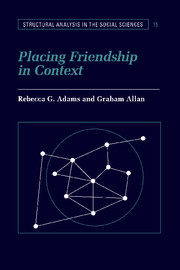Book contents
- Frontmatter
- Contents
- Notes on the contributors
- Acknowledgements
- 1 Contextualising friendship
- 2 The modernisation of friendship: individualism, intimacy, and gender in the nineteenth century
- 3 The gendered contexts of inclusive intimacy: the Hawthorne women at work and home
- 4 Friendship and the private sphere
- 5 Rich friendships, affluent friends: middle-class practices of friendship
- 6 Women's friendships in a post-modern world
- 7 Foci of activity as changing contexts for friendship
- 8 The demise of territorial determinism: online friendships
- 9 Reflections on context
- Index
- Structural Analysis in the Social Sciences
3 - The gendered contexts of inclusive intimacy: the Hawthorne women at work and home
Published online by Cambridge University Press: 15 December 2009
- Frontmatter
- Contents
- Notes on the contributors
- Acknowledgements
- 1 Contextualising friendship
- 2 The modernisation of friendship: individualism, intimacy, and gender in the nineteenth century
- 3 The gendered contexts of inclusive intimacy: the Hawthorne women at work and home
- 4 Friendship and the private sphere
- 5 Rich friendships, affluent friends: middle-class practices of friendship
- 6 Women's friendships in a post-modern world
- 7 Foci of activity as changing contexts for friendship
- 8 The demise of territorial determinism: online friendships
- 9 Reflections on context
- Index
- Structural Analysis in the Social Sciences
Summary
In 1927, a group of men from the Western Electric Company's Industrial Relations branch initiated a new series of studies at the Hawthorne plant in Chicago. They began by removing five female operators from their regular department, and they relocated them in a separate room where they could be studied doing their familiar jobs. Thus began the famous Relay Assembly Test Room (RATR) – the longest and most hotly debated of the various Hawthorne studies.
Since the ending of the RATR over six decades ago, new waves of analysis have revisited every detail bearing on the women's work productivity, and this singular focus has dominated more than one discipline. In psychology, Bramel and Friend (1981) provoked a flurry of controversy with a Marxist approach, recasting the drama inside the RATR as a class struggle between bosses and workers, and attacking other analysts for giving short shrift to the strategies of ‘resistance’ the women employed. Sociologists have sought the comfort of multivariate statistical models, asking, for example, if there really was a ‘Hawthorne Effect’ on the women's productivity (Jones, 1992). In business administration, the women became minor celebrities. Rediscovered in the 1980s, they were invited as a panel to a 1986 conference, where they reminded their interlocutors that their productivity rose in the RATR because they were happier there, they liked each other, and they earned more money.
The obsession with the circumstances surrounding the women's production is both curious and unfortunate, because there are other aspects of the women's lives that are no less worthy of interest.
- Type
- Chapter
- Information
- Placing Friendship in Context , pp. 43 - 70Publisher: Cambridge University PressPrint publication year: 1999

